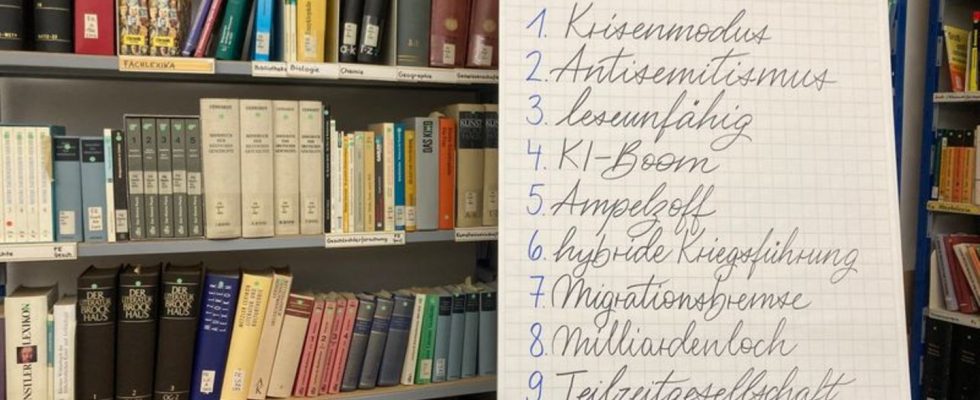New Year
Which new words are finding their way into the German language
The word of the year “crisis mode” comes first before the words “anti-Semitism” and “unable to read” on a blackboard. photo
© Andrea Löbbecke/dpa
The “Word of the Year” for 2023 is “crisis mode”. How apt the choice was can also be seen in words that are new to the German language. A Leibniz Institute collects neologisms of the year.
Every year the spirit of the times is reflected in our vocabulary. From the end of December, Petra Storjohann will get to grips with which new neologisms are worth and important to find their way into the neologism dictionary. This online lexicon is updated with 100 new words every year at the Leibniz Institute for the German Language (IDS) in Mannheim.
“Politicians, journalists and “Influencers are the driving forces for new words,” says project manager Storjohann. “Although in 2023 these were not such creative new creations, but rather sober expressions that relate to the crises of the present.”
Many new word combinations
The words of the year 2023 show: The German language is proving to be an ideal tool for constantly forming new word combinations with “-crisis”. The “wheat crisis” as a result of the war in Ukraine is relatively recent; also the “supply chain crisis”, with “semiconductor shortage” and “chip shortage”. The “energy crisis,” on the other hand, has been around for a long time.
In their wake, terms such as “gas price brake”, “gas levy” and “gas emergency plan” emerged. In view of the real or feared lack of energy, “caps” must be implemented, whether in the form of a “gas price cap”, “oil price cap”, “electricity price cap” or generally as an “energy price cap”. While “extended operation” will probably be less in demand after the nuclear power plants are shut down.
IDS searches texts for new words
The basis for all of these linguistic observations at the Mannheim IDS is the world’s largest electronic collection of German-language texts, currently containing 55 billion words. These come from almost all newspapers, magazines and public publications available online. At the end of January, the new, gigantic text package from last year will be completely available for evaluation.
“Every word that has never appeared before is automatically detected by our search program on the IDS,” explains Storjohann. “By the time a new word is in the dictionary, it should appear at least 50 times, be documented in various sources, nationally and over time, i.e. at least over a few months.”
A good criterion for inclusion is also high relevance in the current public discourse. That means: “Heat pumps” have always been there, but are now appearing more frequently. While “Deutschlandtempo” and “Doppelwumms” remain under observation, even if these terms have been in circulation since the end of 2022.
“Scholzen”, “Climate Glue” and “Panzer Ring Exchange”
Chancellor Olaf Scholz (SPD) is now even active in the form of a verb. The content of “scholzen” may vary depending on your political point of view, but from Storjohann’s point of view it has to do not least with questions of style in public appearances.
When words are coined in the area of climate crisis, a certain evaluation often resonates: terms range from “climate glue” to “climate disasters” and “climate terrorists” to “climate RAF”.
What is also striking for linguist Storjohann is the growing number of military-related words. The attack by Russian troops on Ukraine is undoubtedly due to words such as “kamikaze drone”, “Himars rocket launcher” and “tank ring exchange”. Although the number of such “military” neologisms is far lower than the neologisms used during the Corona crisis. The IDS has recorded more than 2,500 new terms, from “Schnutenpulli” or “Maultäschle” for FFP2 masks to “baby elephant” as a benchmark for a safety distance of one and a half meters.
Anyone can suggest new words
The number of neologisms in the German language continues to grow. “We haven’t become more creative when it comes to new word creations,” says Storjohann. “We only exploit the word formation possibilities and patterns. And those are the numerous word combinations in German.”
Next year, the IDS wants to come up with a completely new, even more complex online version of its neologism dictionary. The institute also accepts suggestions for new words that people have heard or read. You can submit them, for example, via the owid.de website on the Internet.

